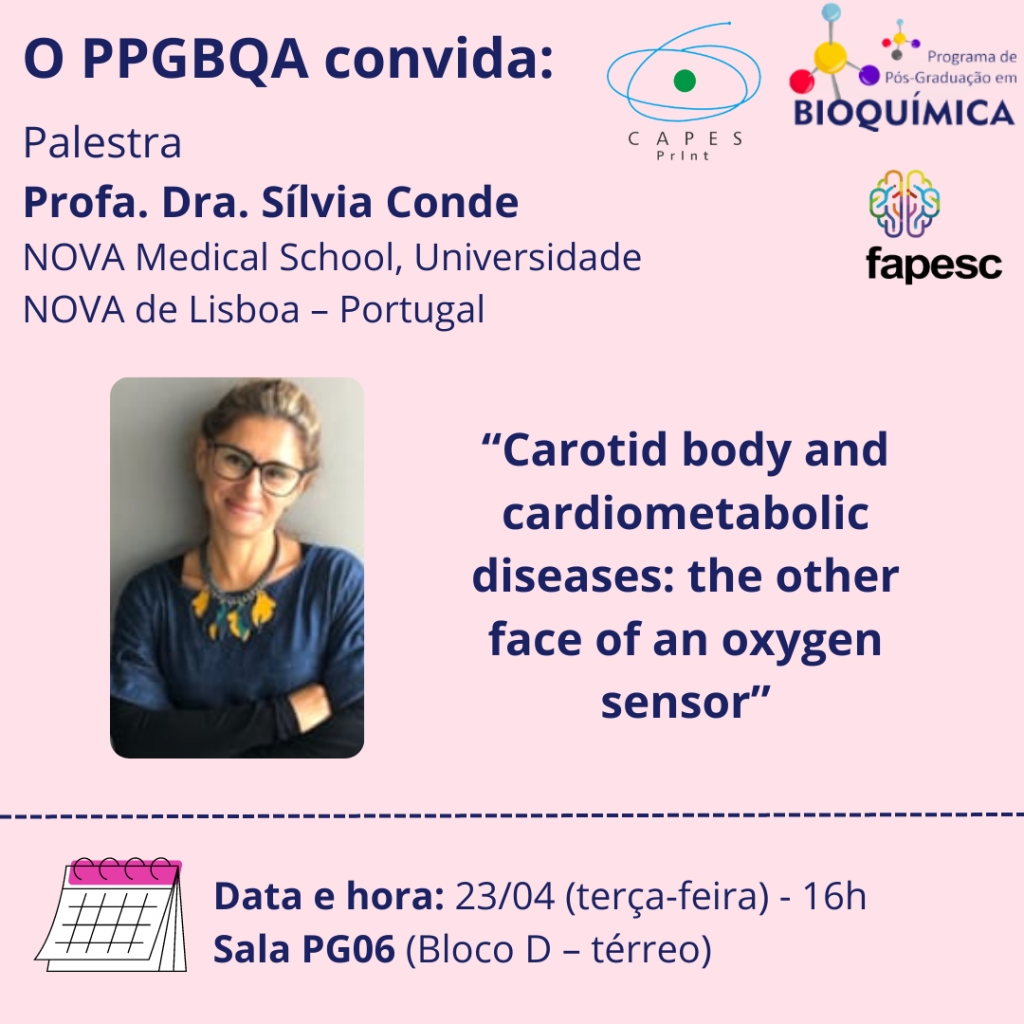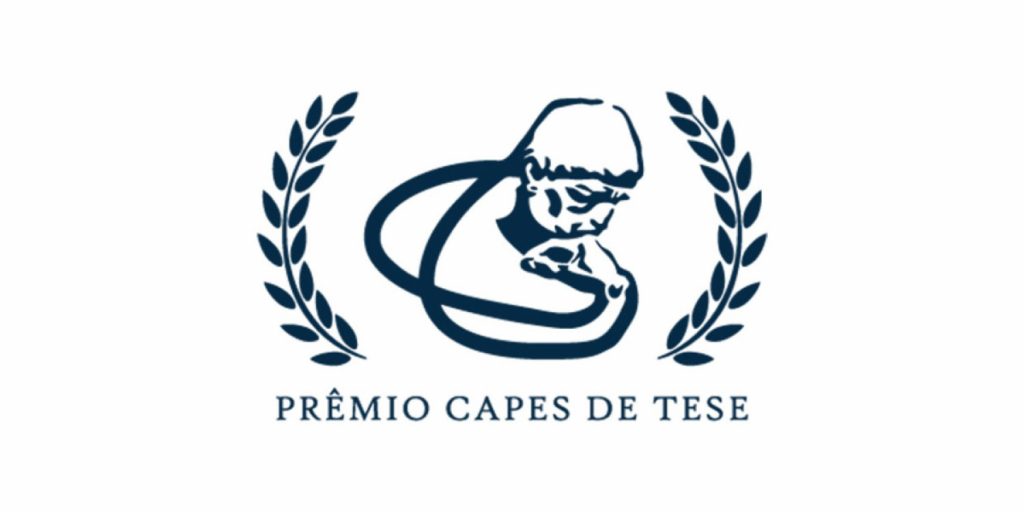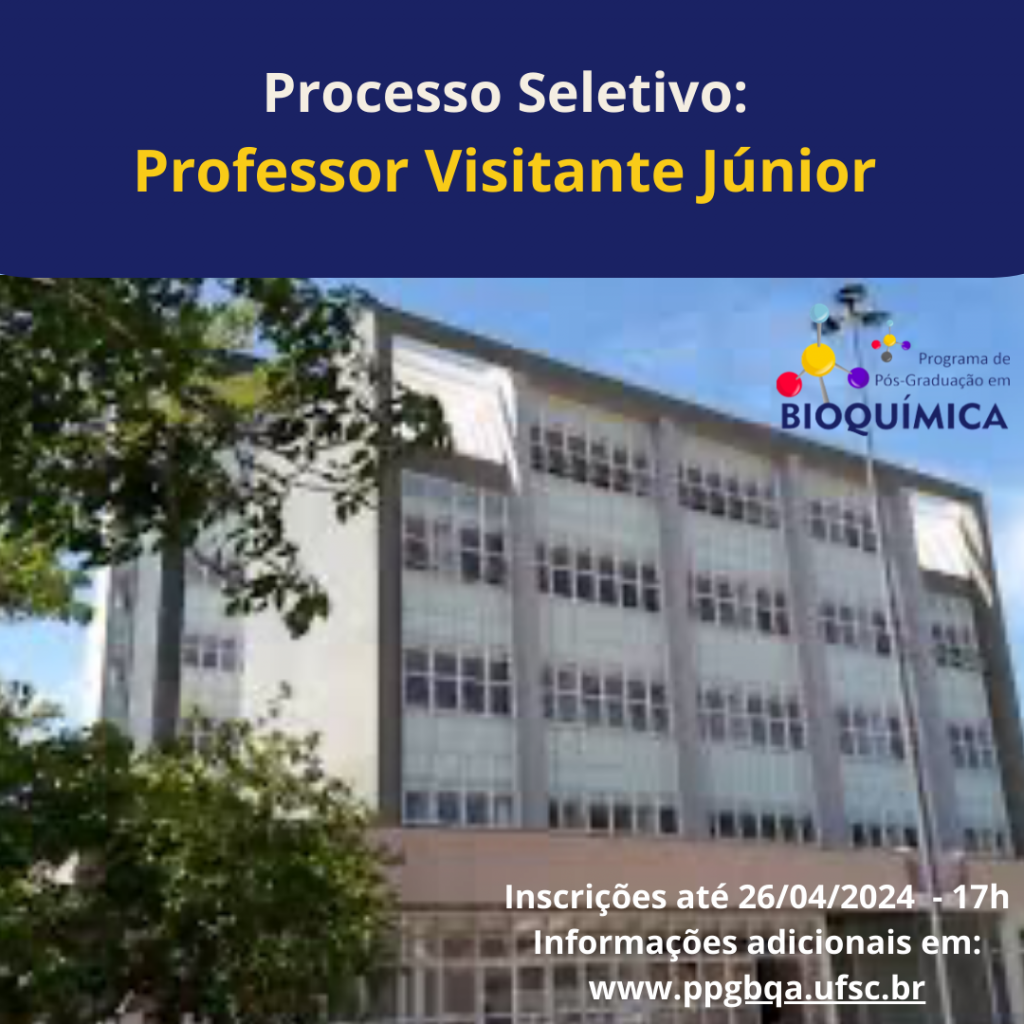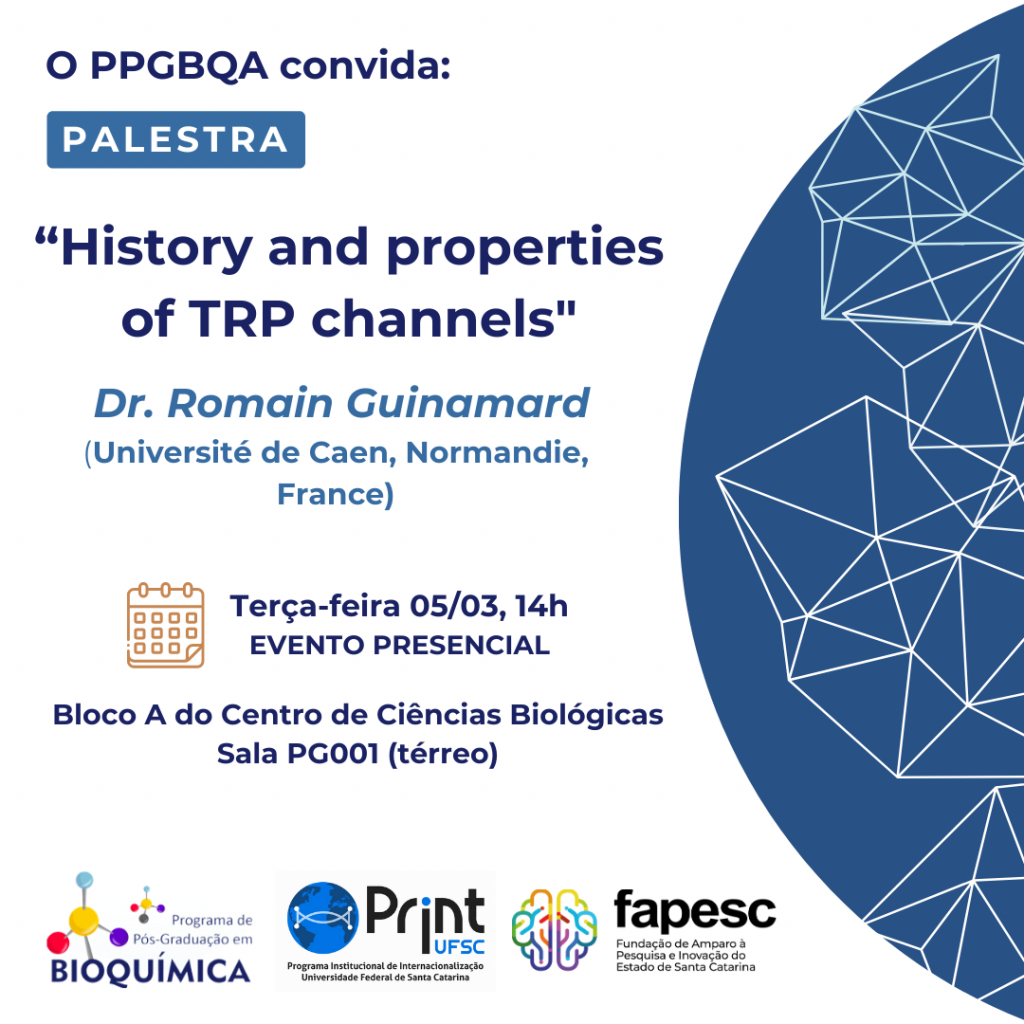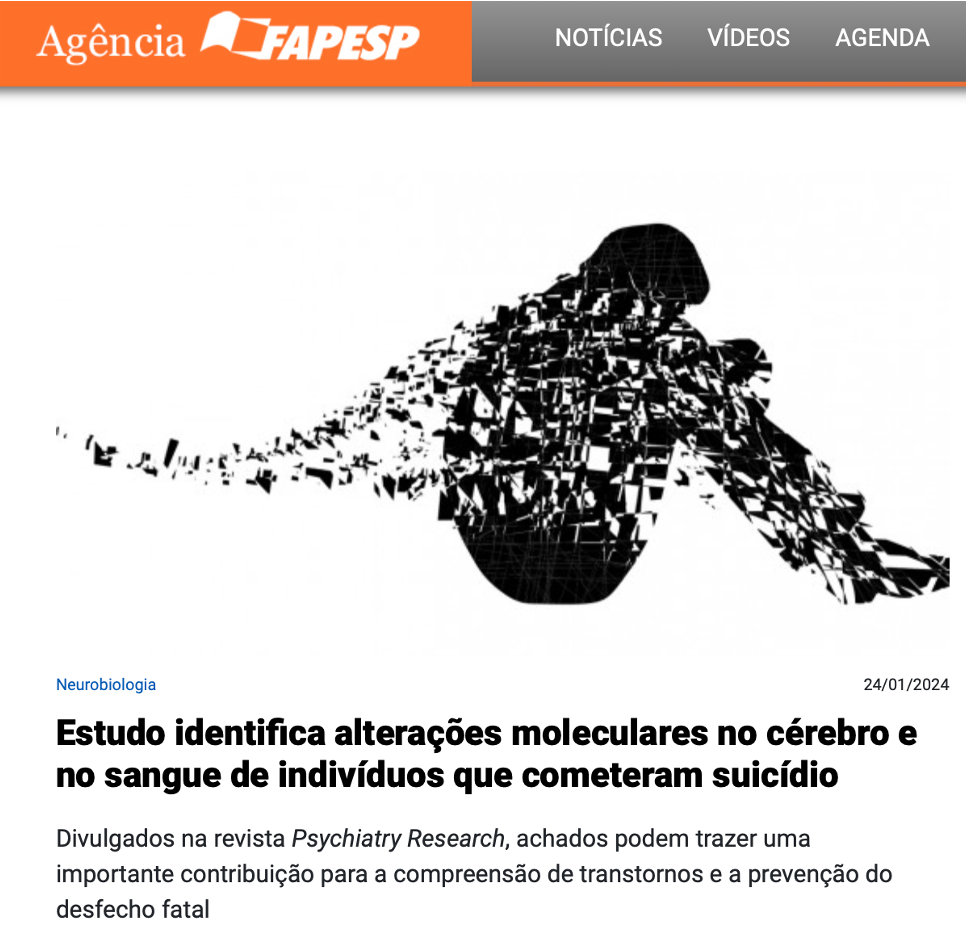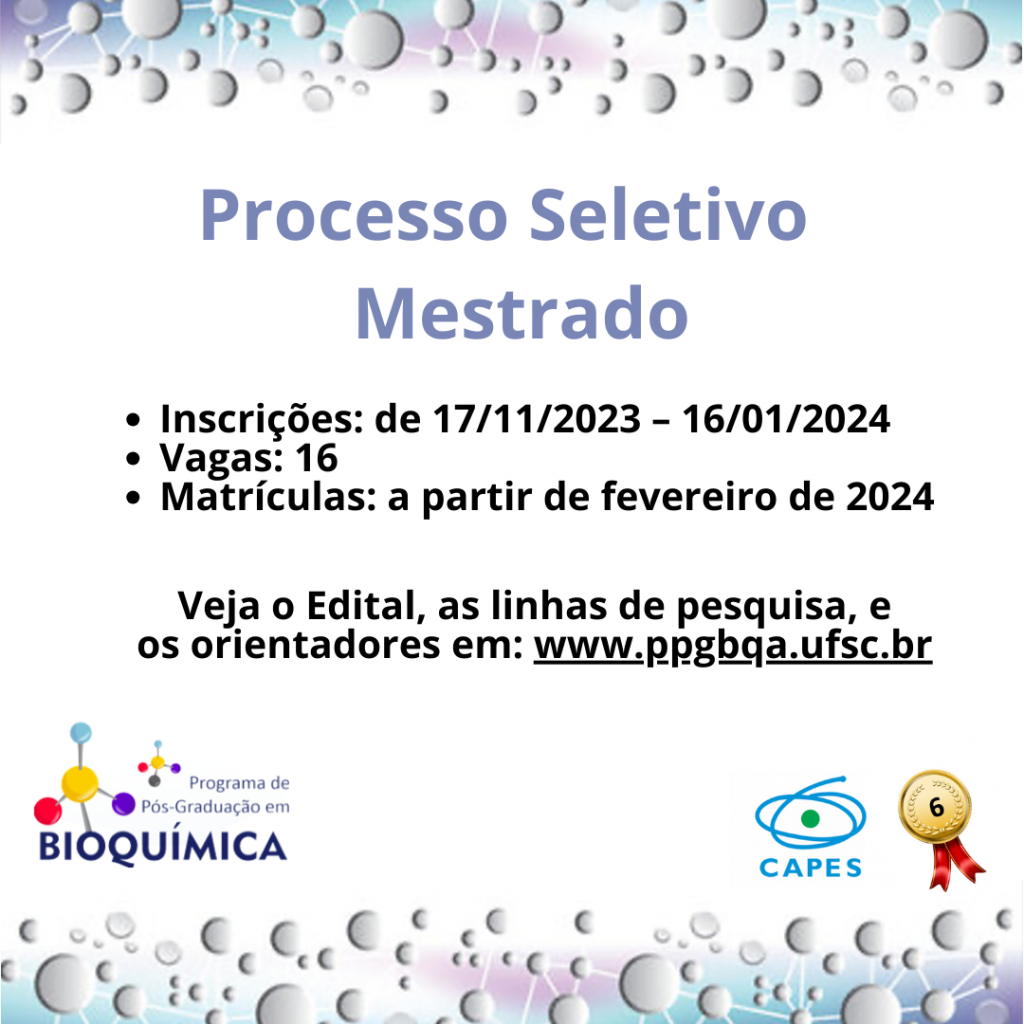-
Publicado em 27/11/2023 às 03:09 PM
___________________________________________________________________________________________________________________________Registration calendar 2024/1
Registration period for regular students: 02/15 to 02/18: online registration period in disciplines of its own Program through the Post-Graduation Academic Control System (CAPG): www.capg.ufsc.br
Enrollment of students from other UFSC programs: as of 02/20: start of registration requests for students from other UFSC Postgraduate Programs. No term limit. The request must be sent to or e-mail: academico.sipg@contato.ufsc.br
Enrollment in an isolated course (people outside UFSC or graduate students from UFSC): 02/21, 02/22 and 02/23. Period for requesting enrollment in an isolated discipline under the Postgraduate Academic Control System (CAPG):
The guidelines for enrollment in an isolated discipline are in the link: Enrollment in an isolated discipline
Enrollment form in isolated discipline
The disciplines of the semester will be informed in the link: https://ppgbqa.ufsc.br/disciplinas-do-semestre/disciplinas-do-semestre/
-
Seminar PGBQA – Dr. Sílvia Conde
Publicado em 23/04/2024 às 07:52 AM -
(Português do Brasil) Prêmio CAPES de Tese – Edição 2024
Publicado em 10/04/2024 às 08:04 PM -
(Português do Brasil) Processo Seletivo Simplificado para contratação de Professor Visitante
Publicado em 05/04/2024 às 01:44 PM -
(Português do Brasil) Seleção para o Programa de Doutorado Sanduíche no Exterior
Publicado em 02/04/2024 às 09:35 AM -
Seminar PPGBQA
Publicado em 29/02/2024 às 06:56 AMAcesse a sala virtual no link: https://conferenciaweb.rnp.br/conference/rooms/daniela-ota-hisayasu-suzuki/invite_userid
-
Molecular changes in the brain and blood of individuals who committed suicide
Publicado em 24/01/2024 às 01:50 PMhttps://www.sciencedirect.com/science/article/abs/pii/S0165178123006327?via%3Dihub
-
Master Selection 2024-1
Publicado em 28/11/2023 às 09:29 AMThe Coordination of the Post-Graduation Program in Biochemistry (PPGBQA) of the Federal University of Santa Catarina informs you that it will be open for the period from 11/17/2023 to 01/16/2024, as registrations for the Seleção e Admissão Processo no Program, at MESTRADO level. Registrations start on February 2024.
For more information, access the “Seleção de Mestrado” page.
Resultado prova Mestrado Edital 02-2023
Resultado: Edital 2-2023 Resultado
-
Doctorate Selection 2024/1
Publicado em 27/11/2023 às 06:19 PMThe Coordination of the Graduation Program in Biochemistry (PPGBQA) of the Federal University of Santa Catarina informs you that it will be open during the period from 11/27/2023 to 02/19/2024, as registrations for the Seleção e Admissão Processo ao PPGBQA at DOCTORATE level.
For more information, access “Seleção de Doutorado“.
-
Oleic acid present in olive oil can combat cell death due to excess iron
Publicado em 14/11/2023 às 12:04 PMIn 1992, a young child died when his two-year-old brother gave him more than 30 bright, colorful pills. Inside the pills was the metal iron, deadly when ingested in excess. The use of tablets at adequate levels by the children’s mothers characterized dietary supplementation, as iron is essential for human beings, and its deficiency also causes harmful effects on health.
The research group, coordinated by Professor Marcelo Farina from the Biochemistry department at UFSC, has studied how excess iron causes damage to organisms and how some fat molecules (lipids) protect against injuries caused by iron. In a study conducted in collaboration with American and Spanish researchers, the research group coordinated by Professor Farina discovered that one of the main mechanisms by which excess iron causes damage is through the induction of ferroptosis, a type of cell death that is still poorly understood and characterized by intense oxidation of lipids in cell membranes. The work was funded by CAPES, CNPq, and FAPESC.
According to the professor, the harmful effects of excess iron do not only occur in severe cases of acute poisoning. “In fact, there is a human disease called hemochromatosis characterized by excess iron in the body due to genetic defects or the need for repeated blood transfusions, which have high levels of this metal”, he explains.
According to him, scientific evidence supports an association between iron levels and aging and points to iron accumulation in aging-related diseases. Patients with Parkinson’s disease have high iron levels in certain regions of the central nervous system. Among the treatments currently available for individuals with excess iron in the body, phlebotomy (bleeding) and chelating medications stand out, which form complexes with iron and facilitate its elimination.
The study, which was based on experimental models using the nematode Caenorhabditis elegans, mice and human cell lines, detected a lipid compound called oleic acid, a monounsaturated fatty acid present in abundance in olive oil, as a protective molecule capable of inhibiting ferroptosis. The consequence would be protection against damage induced by iron overload in the three experimental models.
“The study suggests that nutritional strategies based on the use of monounsaturated fatty acids, such as oleic acid, can mitigate the damage induced by excess iron, which could represent an additional therapeutic strategy”, explains the professor. “Interestingly, oleic acid is part of the Mediterranean diet, which is associated with health and longevity,” reinforces
Another mechanism uncovered in the study was the involvement of a key protein that determines whether oleic acid can be protective. In this case, the protein PPAR-alpha (peroxisome proliferator-activated receptor-alpha) was considered fundamental to the ability of oleic acid to protect against damage induced by excess iron in cells and nematodes.
The results of the study were disclosed in a scientific article published in the journal Cell Chemical Biology, which has as its first author researcher Josiane Mann, who was supervised by professor Marcelo Farina during her doctorate in the Postgraduate Program in Neurosciences and is currently a postgraduate fellow -Ph.D. from PPGBQA. The UFSC team included PPGBQA doctoral student Melania Santer and professor Alcir Dafré. The work is also signed by Professor Brent Stockwell (Columbia University, United States), who coordinated the pioneering work that culminated in the discovery of ferroptosis around a decade ago.
The results of the study were published in the journal Cell Chemical Biology, which has as its first author the researcher Josiane Mann, who was supervised by professor Marcelo Farina during her Ph.D. in the Postgraduate Program in Neurosciences and is currently a post-doctoral fellow at the PPGBQA. The UFSC team also included PPGBQA doctoral student Melania Santer and professor Alcir Dafré. The work is also signed by Professor Brent Stockwell (Columbia University, United States), who coordinated the pioneering work that culminated in the discovery of ferroptosis around a decade ago.
See the report at: https://noticias.ufsc.br/2023/11/oleo-presente-no-azeite-de-oliva-pode-combater-morte-de-celulas-por-excesso-de-ferro-diz-pesquisa-da-ufsc/ and the manuscript at: https://www.sciencedirect.com/science/article/pii/S2451945623003732?via%3Dihub

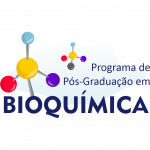
 »
» Português do Brasil
Português do Brasil Español
Español